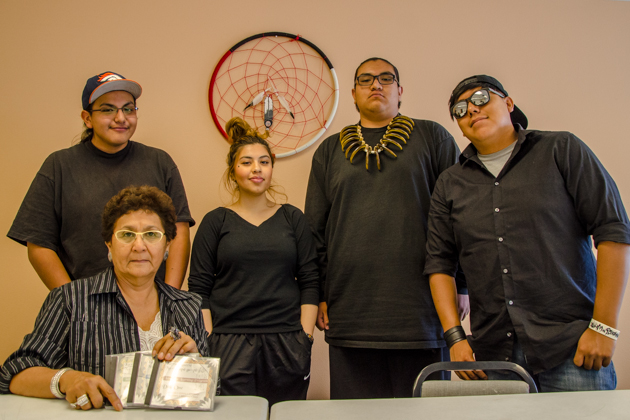History is more than just seeing things as part of the past. For many, it plays the important role of preserving for the future. As modern technology and lifestyles continue to grow, a big part of history may be lost due to neglect and become no more than just a page in a textbook. According to tribal elder, Lynda Grove D’Wolf, the Ute language class is aiming high in keeping the cultural preservation of the Southern Utes alive, except there is one problem: lack of interest.
The class was introduced in 2014 under the guidance of Tribal Council and has since offered a composed learning experience for high school students. Tribal elder, Lynda Grove-D’Wolf, has been teaching the class since its formation and has noticed a decrease in attendance throughout the year. So far, bringing new faces has been the most challenging thing for the class, she said.
“The class started when Chairman Frost first came on board with the idea of implementing language classes in our schools,” Grove-D’Wolf said. “These students are the future of our culture, and if we don’t push it hard enough, then our language is going to die. We’d like see involvement from the [higher ups]. If our [community] wants our language to survive, then they have to give us support.”
High school student, Rylan Herrera, gave his opinions on why he finds language preservation to be important.
“I see tribal members who just live off the reservation and don’t work,” he stated. “We are the last generation for our tribe. We also have the least cultural background and it’s sad.”
“I believe it’s important for us to engage like this because it’s up to our generation to bring back our culture,” Autumn Medicine-Blanket stated. “I think the next generation is going to catch on. People are taking action, even though it’s taking awhile in getting there.”
Language classes are held every day at the Southern Ute Education Department and are open for all tribal members. Participating students who attend will receive a foreign language credit as well as an elective credit.
Additionally, qualified language speakers are allowed to teach these courses without a teaching certificate; all that’s needed is an approval from the school.
“It’s been difficult trying to get funds from the government,” Grove-D’Wolf addressed. “It’s kind of like pulling teeth. Everything I’ve done for my students has come from my own pocket. My students here could be teachers for the little ones. These students have a good grasp on the vocabulary, but still don’t see any support.”
The challenges of the class have presented itself, but many students see it as an opportunity to reach out the public and engage with non-Ute speakers.
“We’ve had difficulty trying to get the message out,” David Boyd said. “In the end, we do what we can for our community. The youth is where to start, because they are going to be the future leaders. Everything has a meaning.”
“Language is the most important thing to us because when you lose the language, you lose everything else,” Hunter Frost said. “People look at us as a ‘paper tribe’, a tribe of wealth. I want to represent myself more than that by being called equal. We must see it as an art in the same way how our elders taught us.”

